Enjoy our inside guide to the charming city of Chiavenna in northern Italy.
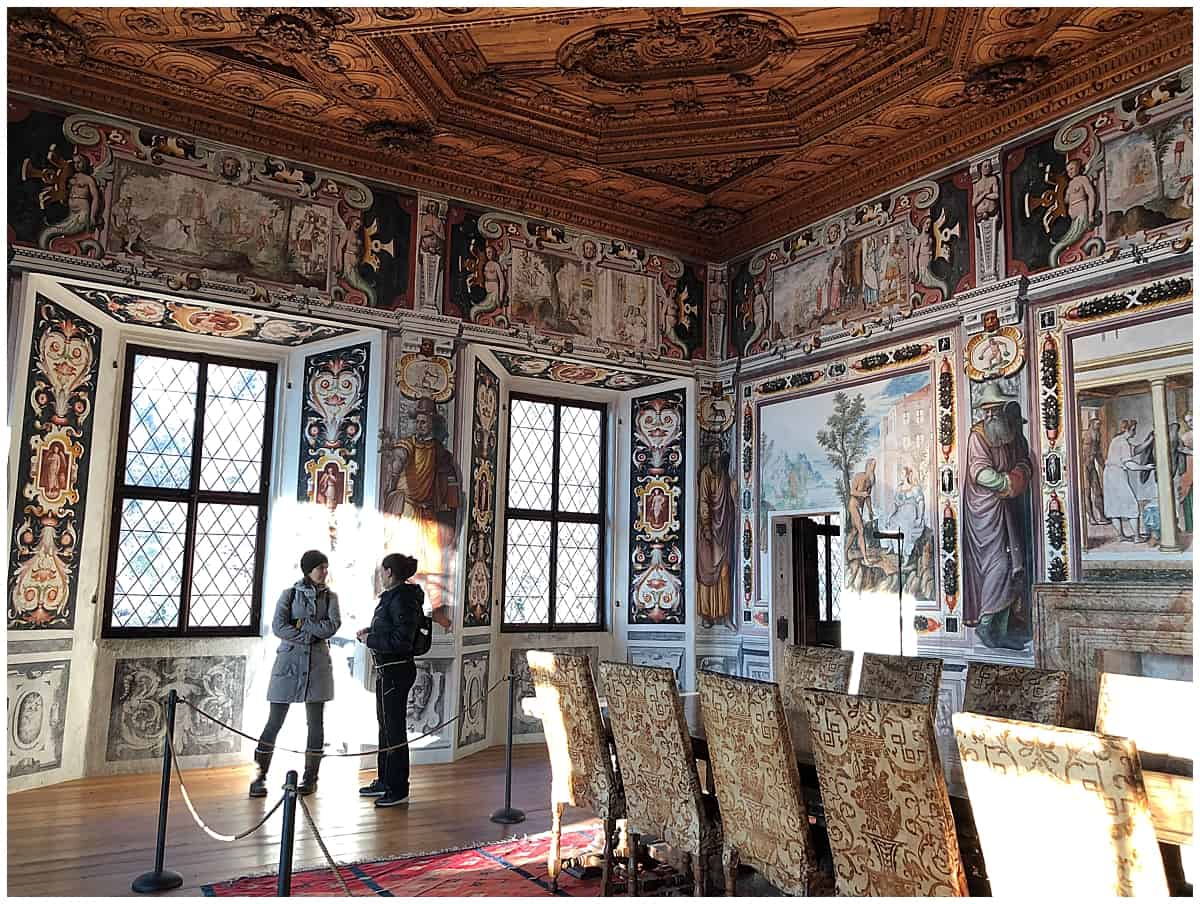
Why you should visit Chiavenna, Italy
As one of Valtellina’s main towns in Lombardy, Chiavenna frequently stars in lists involving day trips from Milan. Once one of the most important place on the Alpine route between Italy and Switzerland, Chiavenna has all the charm of, say, Verona, but in winter, none of the crowds.
My memories of Chiavenna involve the mountain air sketching my breath into wistful clouds that linger. Linger between the views from a summery Italian dream: vineyards, frescoes and spires of crumbling stone. The figures of classical Italy, framed by snow-encrusted clouds.
How do you pronounce Chiavenna?
Chive – enna?! Cheee-AV – enna? No. It’s more like Key-VENna but the more lilting you can make it, the better.
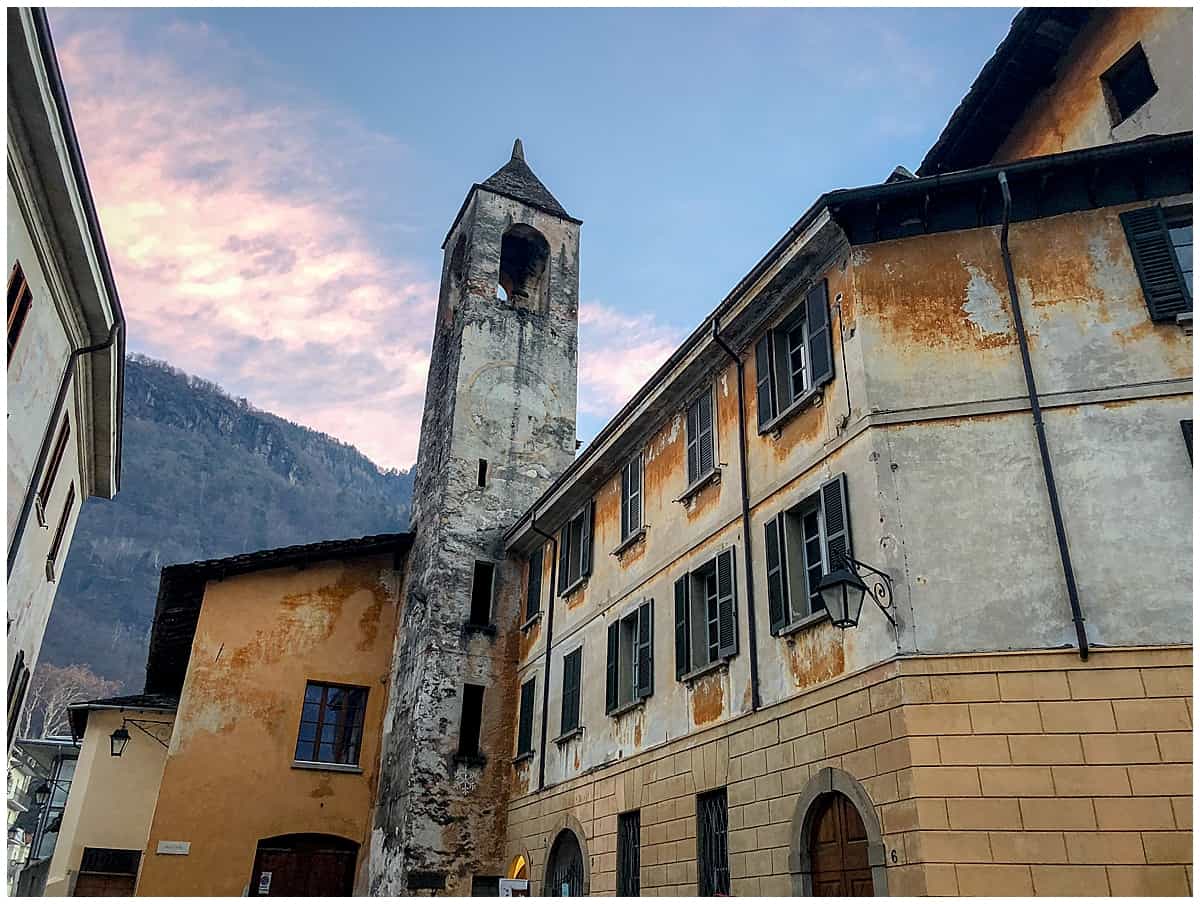
What to expect in Chiavenna, Italy
With its stone courtyards, twinkling lights and sumptuous food, Chiavenna is perfect for a long weekend visit in winter, and as a base for surrounding Valtellina.
From the Romans to the Renaissance, with swaying bridges that dip into the sky, Chiavenna stars as my surprise discovery in a country I thought I knew.
While many mountain towns look postcard pretty perfect, Chiavenna’s unique footprint of history and geology sets it apart.
It’s a story of Roman quarries and medieval trading routes. Of fame and wealth, decline and tradition. Reinvention and the introduction of motorised winter sports.
All fed, quite literally, on a platter of folding soft ham, hot cheese and unfairly good sweet treats.
The Best Things to do in Chiavenna
Right, let’s get to it. Here’s the collection of great things to see and do in Chiavenna.
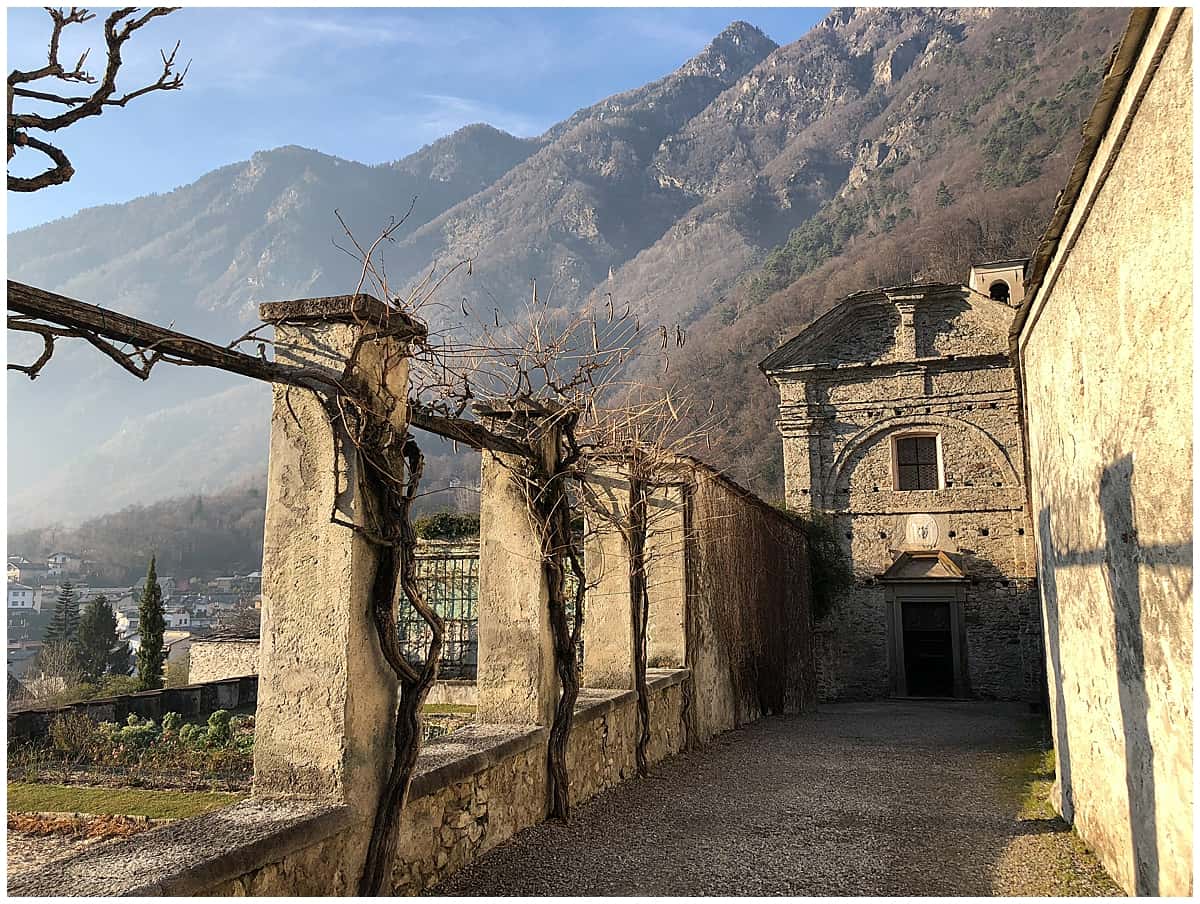
Visit Palazzo Vertemate, Chiavenna
Just out of town in Chiuro, Palazzo Vertemate invites contradiction at every turn. With its own chapel, vineyards, Italianate and orchard gardens, not to mention an imposing entrance, it seems every inch the grand country manor.
Yet the original owners, the Vertemate Franchi brothers, designed this to be a simple, rustic kind of medieval mansion. The frescoes reflect the ties with nature and a desire for simplicity that seems a hard circle to square with the opulence of the zodiac room and stately polished wooden meeting room.
It offers a fascinating insight into life during the Renaissance, when wealthy families ran empires of trade, art and science across the gateways of Europe.
A painting upstairs shows just how prominent the family used to be. And a painting opposite sheds light onto how it all came to an end so suddenly.
The Tragedy at Palazzo Vertemate
A great landslide in 1618 smothered the city to near completion. As merchants, two of the owners were out of the country on business. They returned to find the village destroyed, their family gone.
Then the very last owner passed the land and grounds to the local people.
Summer sees concerts, exhibitions and family gatherings but it is still possible to visit in winter.
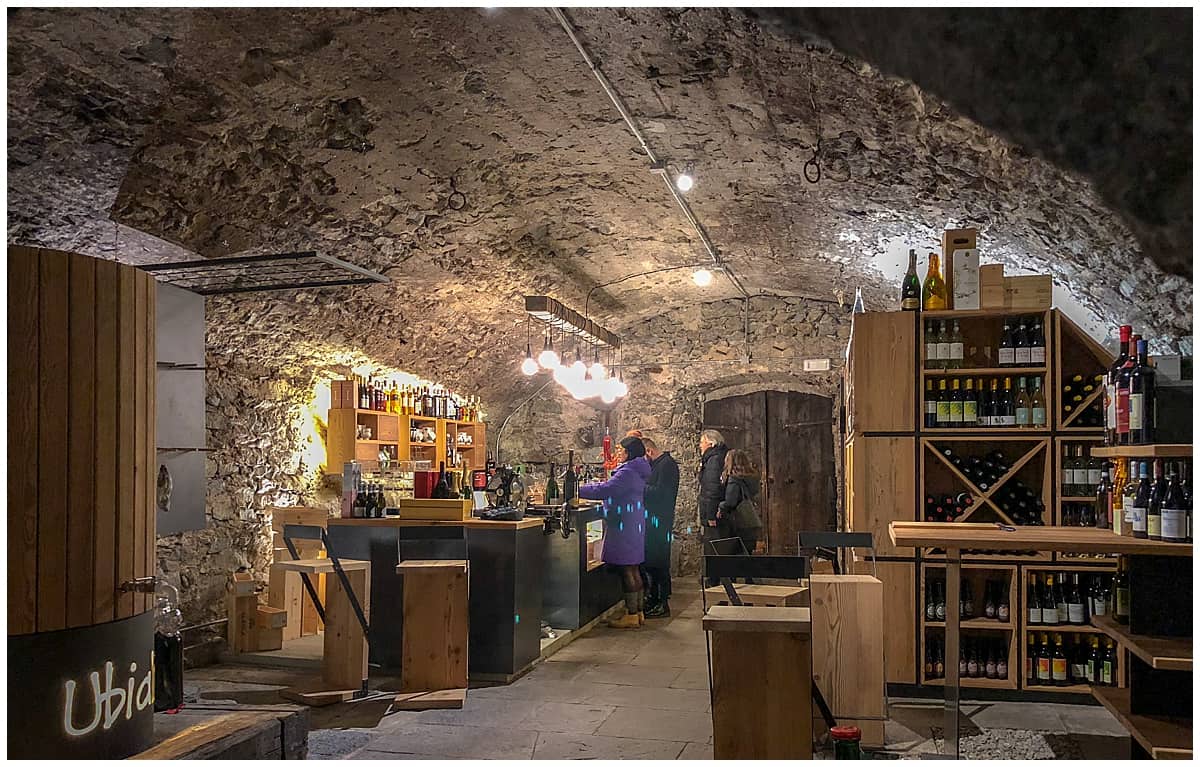
Spend an evening in a cave
With over 1000 caves, Chiavenna is a crotti extravaganza.
While caves in mountains may not be new, the idea of caves as a luxury item may well be.
During the golden medieval heydays, refrigeration didn’t involve electricity and lights in your face every time you’re procrastinating.
Instead, food preservation required precision and it helped to have a damn good cave.
As technology progressed, the well off converted their caves into wine cellars and added heading to some sections to create well-established restaurants.
Now a key pastime is to sip an aperitivo in a crotto, while nibbling on bresaola.
Some hot sciat cheese balls help against the cold too. I’d highly recommend Crotto Ubiali but you’ll find several others to choose from dotted around the caveside of Chiavenna.
Recommended reading: 7 Unusual Things To Do in Italy
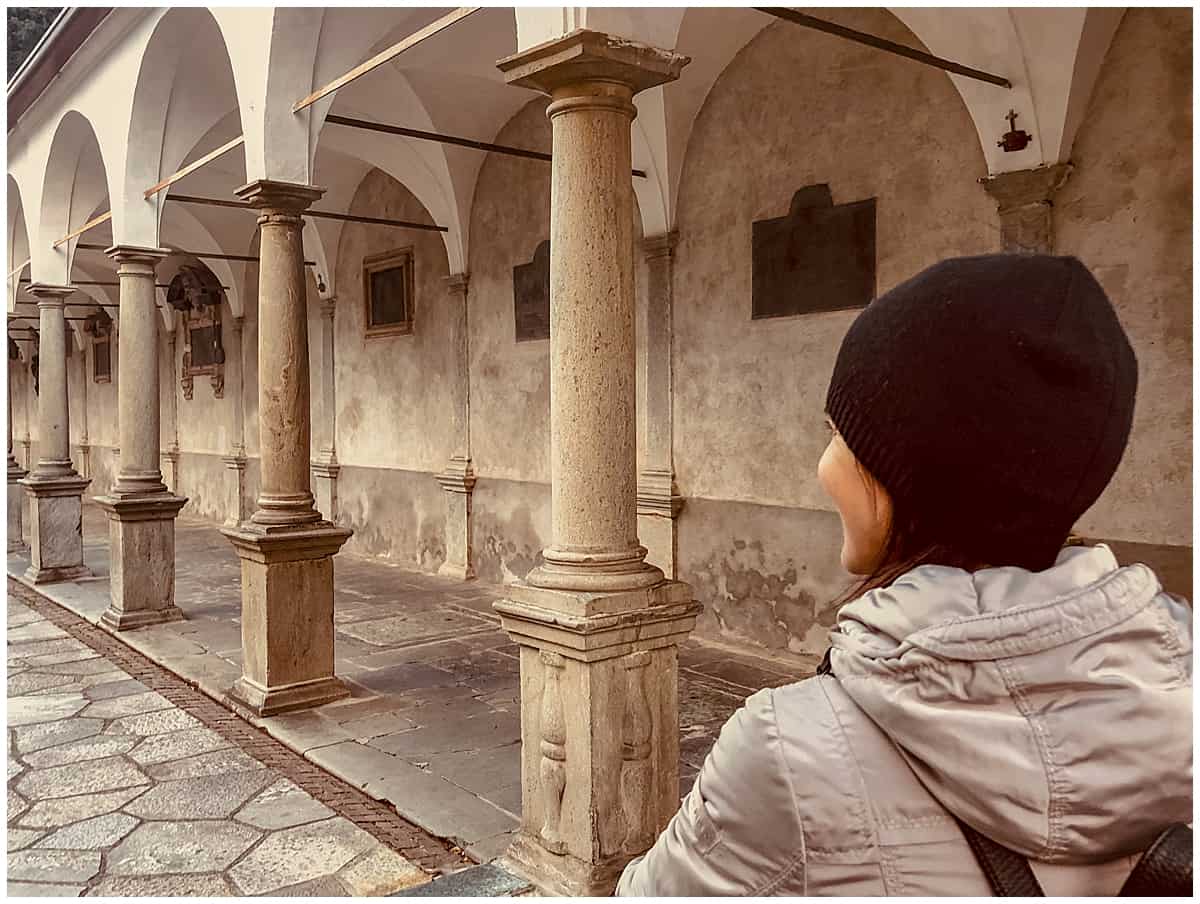
Visit San Lorenzo Monastery
Walk through the picturesque grounds of the San Lorenzo Monastery as the sun sets in winter for an enchanting look at the past (and the mountains behind.)
Originally built in the 12th century, the monastery has undergone several renovations and additions over the centuries, including the addition of stunning frescoes and a beautiful bell tower.
Meet the stone figures on the Mera River Bridge
If the stone figures over the gushing Mera river seem familiar, it’s because they are. The sculptor was the same artist behind the iconic figures on Karluv Most, or Charles Bridge in Prague. (They featured pretty heavily in one of the original Mission Impossible films if you’re old enough to remember that far back guys…)
Taste Pizzoccheri
When you hear about pasta, cheese and butter, it doesn’t sound too good. In fact, it sounds like the kind of thing a student would knock up because there wasn’t anything else left in the kitchen (and they were too bored or broke to go to head out for junk food.)
In reality, the ingredients are 80% buckwheat flour and 20% wheat flour, cheese, garlic and butter.
So, yes. Cheese, carbs, butter. But if my tastebuds could turn into an emoji they’d be raining little hearts of skipping joy across your screen.
Pizzoccheri tastes amazing!
And even after spilling all these words onto the page, I simply can’t do it justice. You just have to head to Valtellina. And taste the stuff yourself.
Face your fear of heights at Piannazzola
Yes, this sounds like the gnocchi-ribbon-chestnut pasta dish I was talking about. But we’re not talking about food but a place this time.
Piannazzola lives just above the city of Chiavenna. But it is WAY above. As in, 635 metres, with a teetering, breathless, beautiful view of Chiavenna with ankle-twisting steep cobbled streets.
It’s barely even a hamlet.
We dined at La Terrazza, a restaurant offering a small, but tasty menu of traditional meats, risotto and soup, and a twinkling view of the city below, with the cloaking velvet darkness of the mountains all around.
Try the Valtellina Wine Routes
It would be remiss of me not to mention the Valtellina Wine Trail, a series of events that combine outdoor exercise with a well-respected reputation for wine. Or, you could skip the exercise part, and just enjoy the region’s hard earned expertise as a key wine area. Up to you.
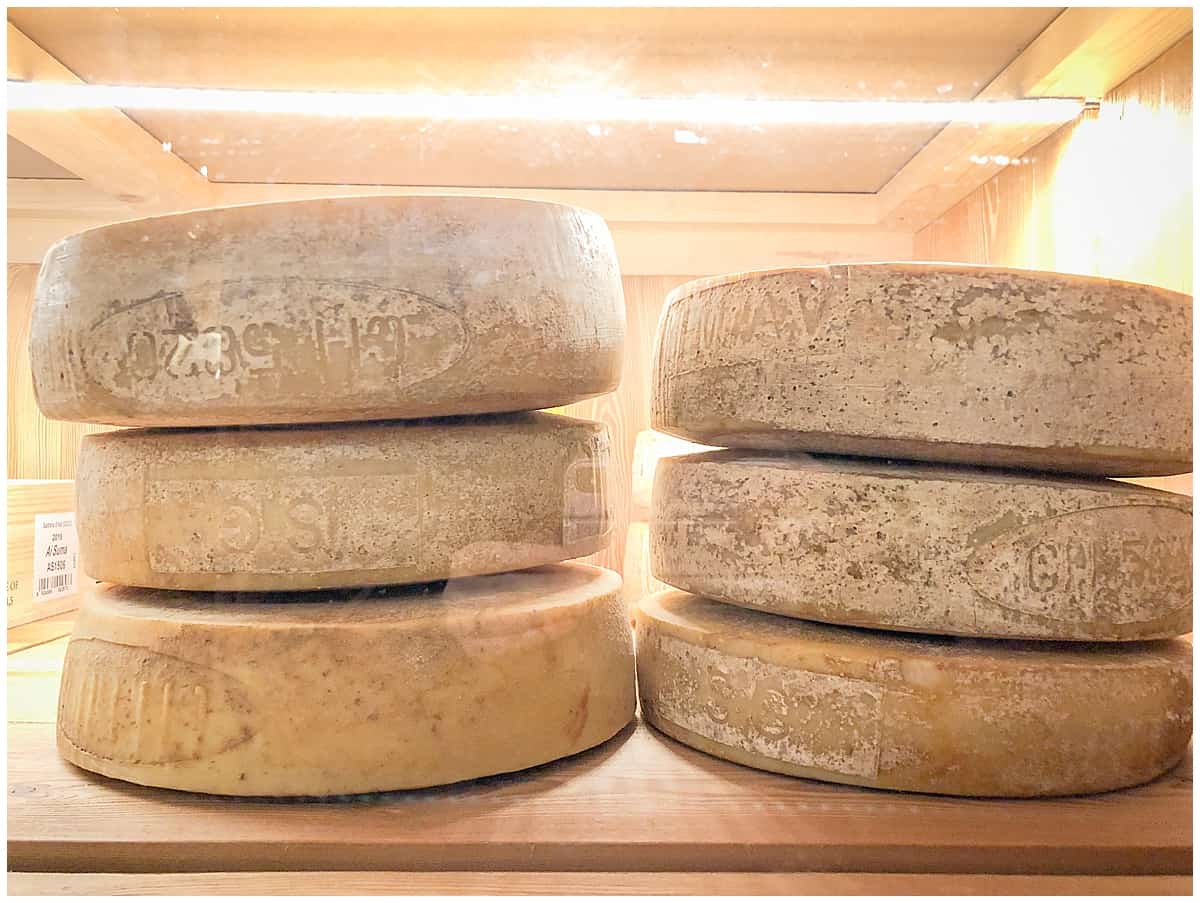
Feast on Bitto Cheese
Travel to any Alpine mountain area and you’ll find yourself awash with cheese. It’s a result of having to survive in harsh conditions and making the most of the what you have.
The Italian Alps are no exception, except that here the cheese mixes and mingles with more glamorous company than some of its cousins to the north.
Bitto cheese is the main one: a hard, slightly bitter cheese produced up in the alpeggi summer huts in the mountains, its name coming from that of the river.
After its summer adventure, Bitto is then aged in cellars for up to 20 years (more about finding delicious versions of those in Morbegno below.)
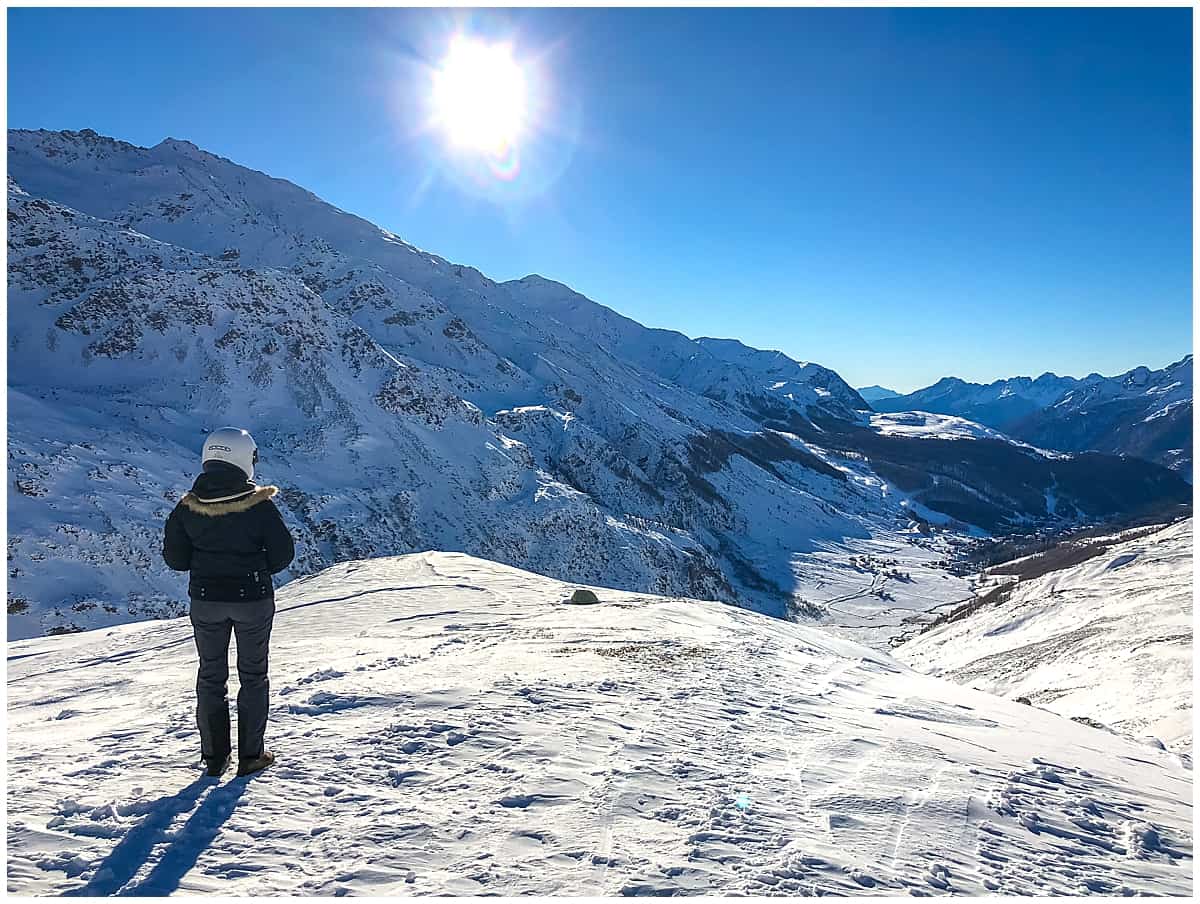
Take to the slopes in Madesimo
Madesimo is a ski resort within an hour or so of Chiavenna. If ski-ing and snowboarding is not for you, try your hand (and feet) at snow mobiling. You need a driving license that’s accepted in Italy and I’d recommend you bring your own helmet as few places have them.
Warm up afterwards with (what else?) pizzoccheri at La Sorgente.
If skidding around on the snow really isn’t for you, then visit local delicacy shop Ma! They run small, informal cooking lessons and are passionate about the art of food.
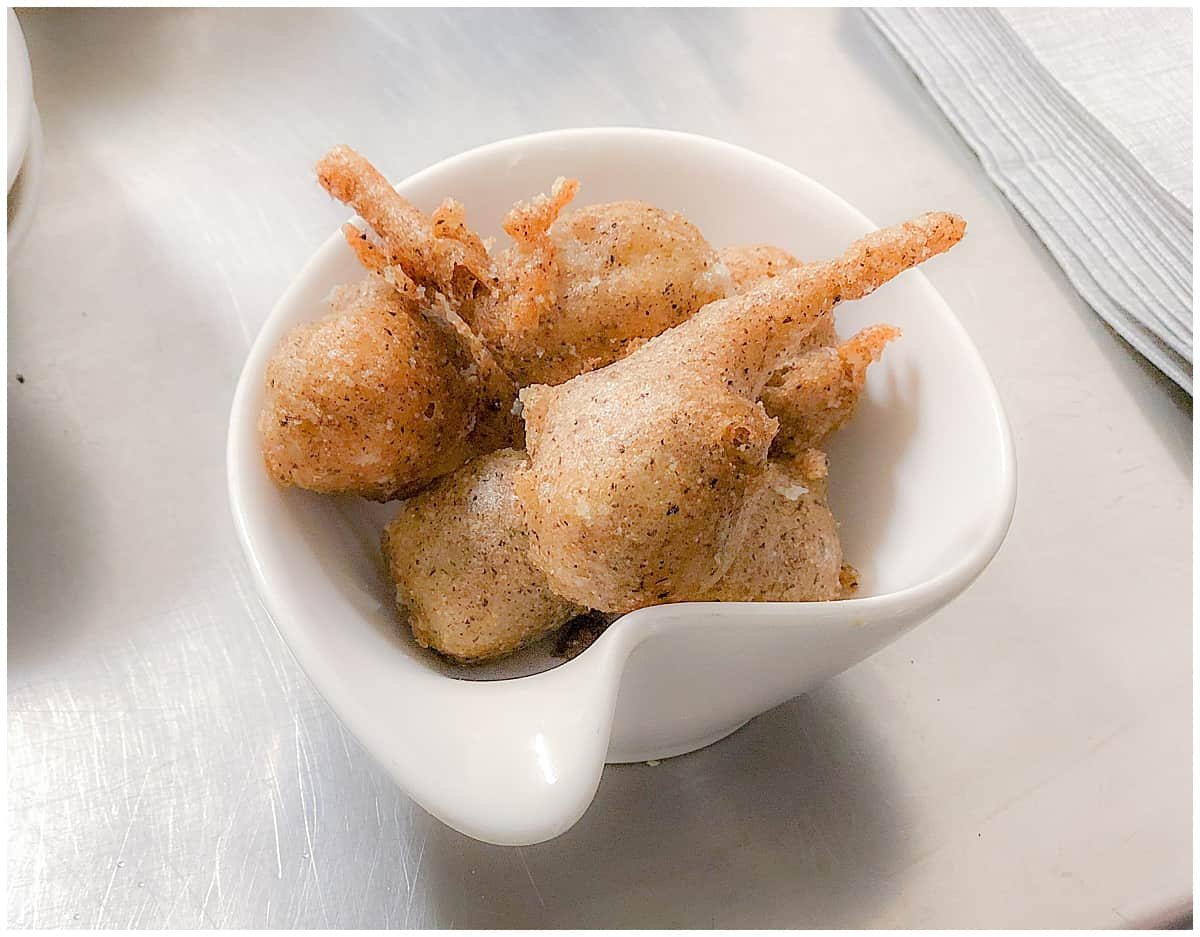
Learn how to cook Sciat
Pronounced (unfortunately) as sh-at, move past the name to enjoy one of the hottest things around. Created from bitto mountain cheese and deep fried in home-made batter, these little balls come with cute tails that make them perfect for a mountainside appetiser.
Visit Ma! in Madesimo for a cooking demonstration. The name comes from the fact that the names of the owners all begin with M. That, and, apparently “Ma!” means “let’s see whether or not this will work.”
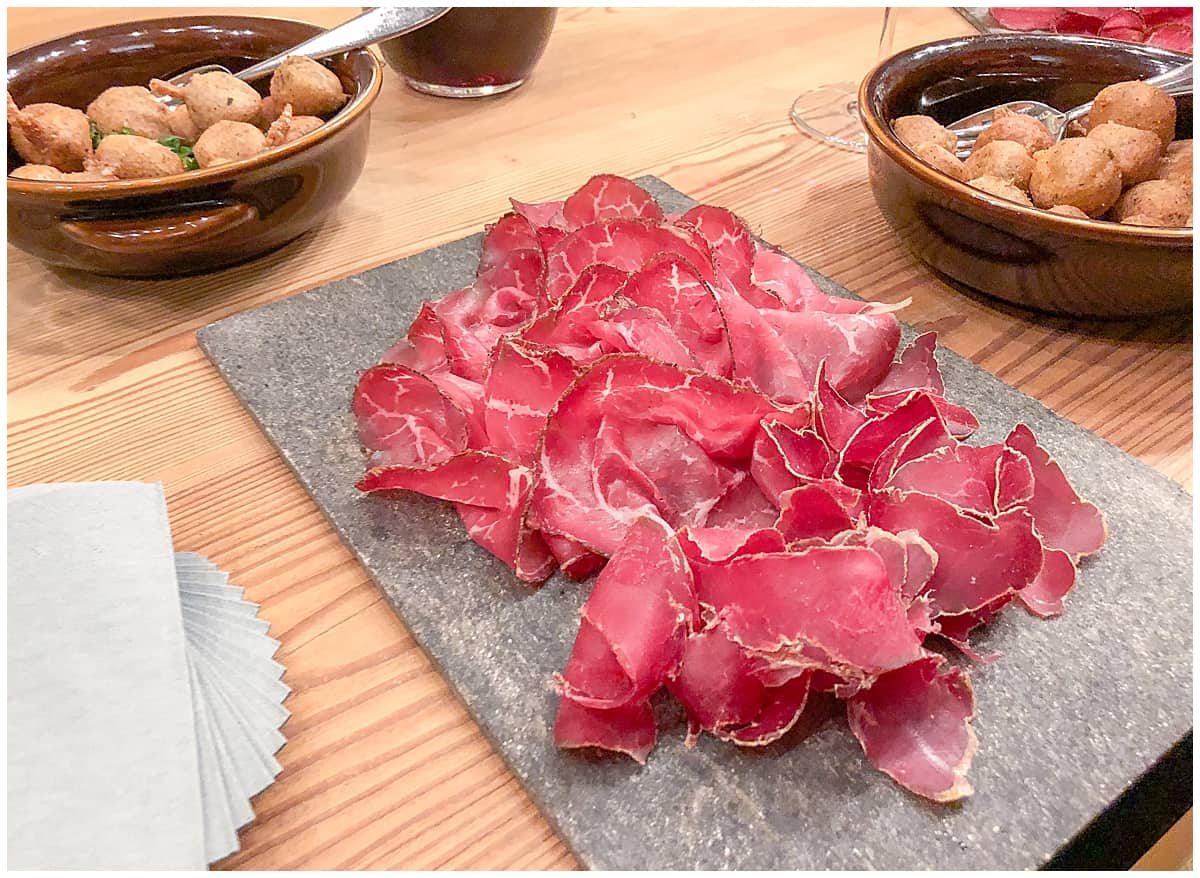
See how bresaola is Made
If you haven’t heard of it before, this is Valtellina’s answer to parma ham, except this is made from beef. Each village, or perhaps even each producer, adds their own recipe to the crust so each tastes distinctly different. Ma! in Madesimo also offers a behind the scenes glimpse of the production process, fungus ‘n’ all.
If you really enjoy it, it may be best to skip this! Once you’ve seen the production process, you’ll never look at it in the same light again.
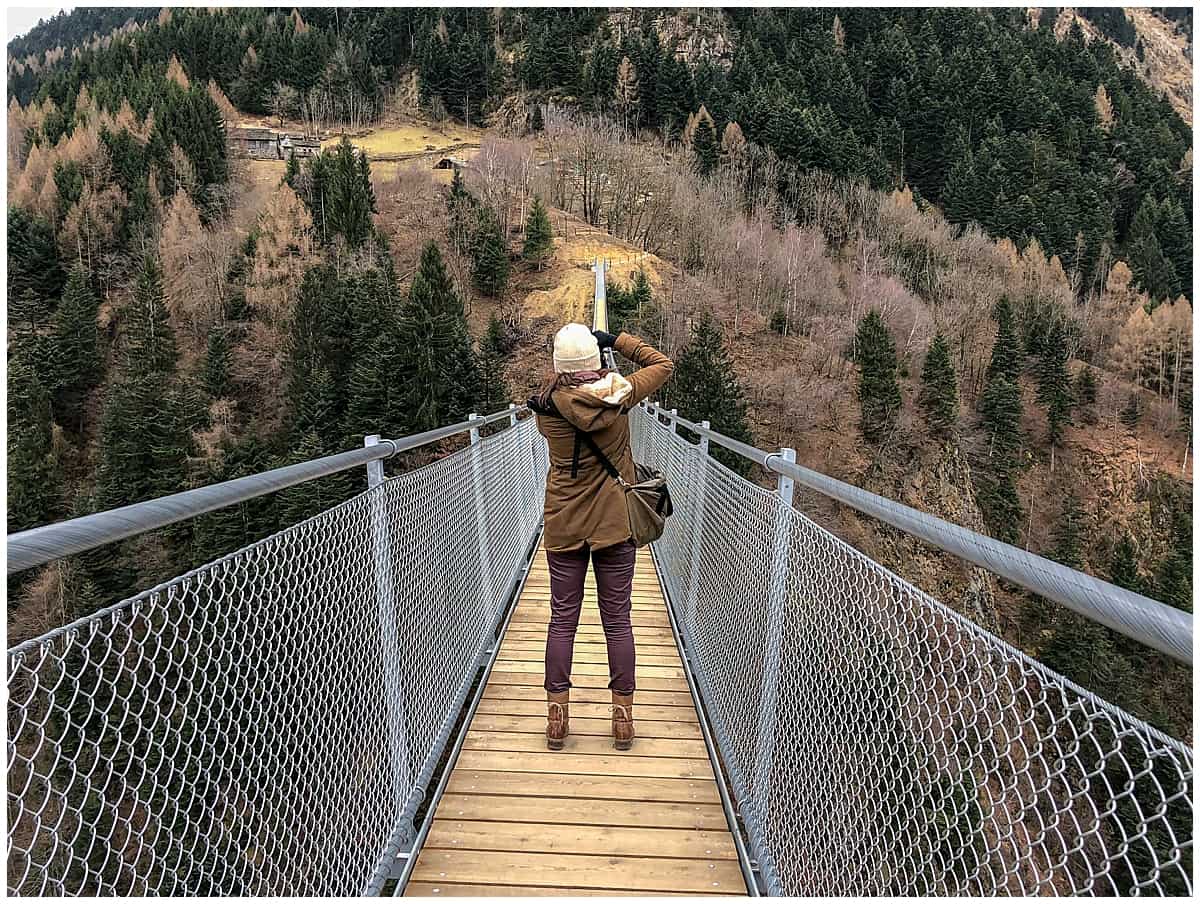
Teeter on Ponte nel Cielo – Italy’s Air Bridge
Billed as the highest of its kind in Europe, the Ponte nel Cielo invites you to teeter over a mountain valley.
This Tibetan style bridge runs 140 metres above the churning water below, wobbling ever so slightly as you walk across.
Designed to provide hikers and villagers with a less arduous commute, it’s now a tourist curio that offers some muscle-quivering mountain views.
Recommended reading: 7 Unusual Things To Do in Rome
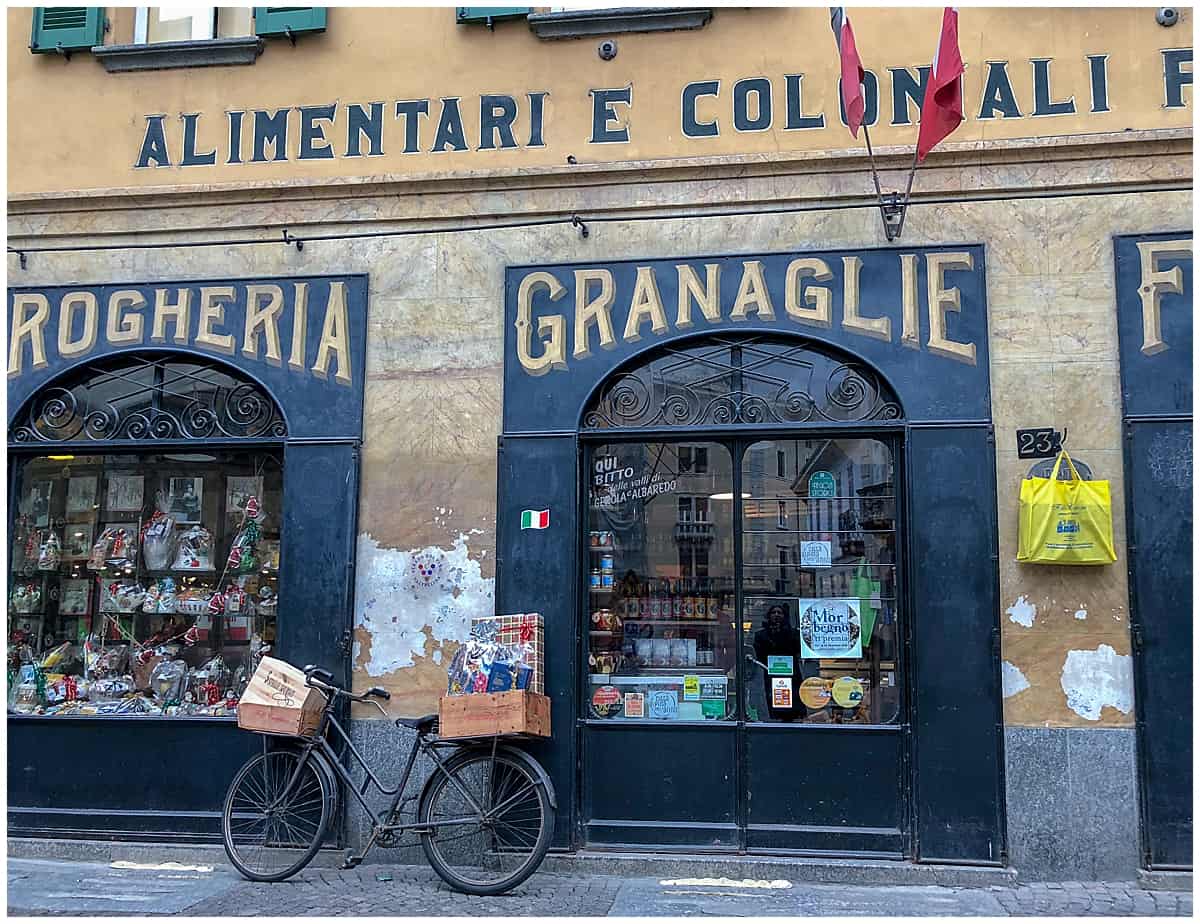
Enjoy the Mountain Village of Morbegno
The mountainside village of Morbegno dovetails nicely with an excursion to see the Ponte nel Cielo. All peeling-paint pretty with cobbled lanes to get lost in, Morbegno excels in its opportunities to indulge and call it a cultural experience.
In particular, look out for these two highlights:
Osteria del Zep
Osteria del Zep serves up Valtellina’s classics with a homemade, working club air. It’s a 400 year old inn with curious memorabilia on display and a cosy if slightly gloomy atmosphere.
Fratelli Ciapponi Food Shop
It’s the last spot in this article, but it’s the top spot in my memories of the best things to do in and around Chiavenna.
It was the sign that first caught my eye. I assumed it was a modern take on an old classic and was delighted to discover it was original.
Drogheria – Granaglie – Formaggi – Cordami. Four words that someone painted in hope and excitement at the launch of a new business venture in 1883. One they scarcely could have imagined someone would be visiting nearly a century and a half later – and broadcasting to the rest of the world.
Unprompted, they invited us in to explore the three storeys of cellars and vaults that house wine, pasta and reams of bitto cheese.
What does Chiavenna mean?
Rumour has it the word stems from “claves” for keys, meaning that Chiavenna is the key to the mountain.
Given its importance to the region over the centuries, it’s tempting to believe this. Romantic, even. However, alas, it doesn’t entirely appear to be true…
How to Get to Chiavenna
Milan is the closest airport city and has three airports of its own: Bergamo, Linate and Malpensa.
The train station is central and the journey straightforward: it’s only two hours from Milan to Chiavenna, so if you only plan to stay in Chiavenna, that may be the easiest way to go.
However, if you have your own car then you can explore a lot more. You can easily drive to the resort area of Madesimo and the picturesque Tibetan bridge in Tartano. But be warned…
Roads here are very narrow, very steep and very windy on the mountains. The drive from Milan is straightforward enough but once in the mountains, you need a strong stomach and laser-sharp eyes. Not for the faint of heart. I mean it!
Where is Chiavenna?
Technically, Chiavenna is a municipality in the Lombardy region of Italy. Within that, it’s part of the Sondrio province.
So, what’s Valchiavenna? That’s the Alpine region that contains Chiavenna. Ah, place names. Throw in one or two thousand years of history and a mish-mash of crossing languages and linguistics, and sooner or later everyone ends up confused.
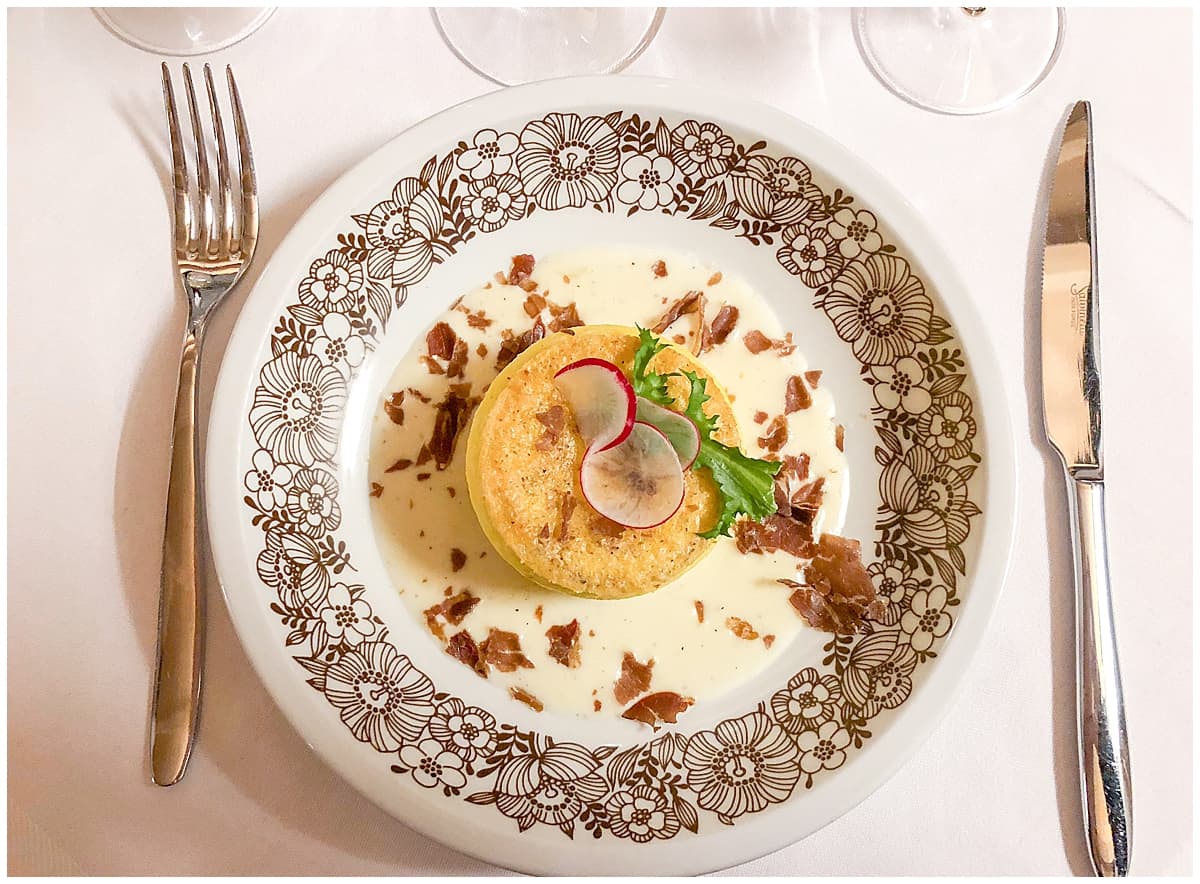
What to eat in Valtellina
- Pizzoccheri – cheese, carbs and butter!
- Bitto cheese – a hard, slightly bitter cheese 20 years in the making.
- Sciat – created from bitto mountain cheese and deep fried in home-made batter.
- Bresaola – soft, ribbony salted beef with an individual crust.
Where to Stay in Chiavenna
Conveniently located for train travel and walks into Chiavenna, Hotel San Lorenzo is a comfortable, clean and classic place to lay your head if you plan on staying for more than a day (which you should.) As a three star hotel, don’t expect runaway design, extravagant breakfasts or a turn down service but do expect a decent place to stay.
Did you know? Chiavenna is part of the Cittaslow movement, inspired by the Slow Food Movement.
Read More About Italy
- The world knows Rimini for its beaches but what about Rimini Old Town?
- The landmarks in Italy that everyone should see at least once
- Two Presidents, No Army and a Mountain of Things to do in San Marino
- 21 Unusual Things to do in Rome
- How to Make a Ragu Your Italian Nonna Would be Proud Of
- Your Perfect Amalfi Coast Itinerary
- Finding Unusual Things to do in Tuscany
- The Secret Spots in Venice
- 7 Unusual Things to do in Italy
- The Best Italian Souvenirs
- The Best Things to do in Umbria, Tuscany’s Neighbour
- Trieste Food Stands Out From the Rest of Italy

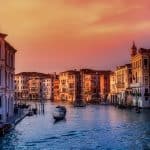
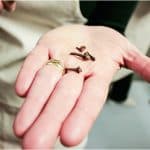

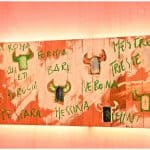
This is a great article. I always love to venture outside a city when I take a city break. I have been pondering Milan for quite a bit and this would be just perfect when I visit. Thanks!
Ah, it gives such a different perspective on the wealth and trade and glamour of Milan… realising how it built up over the centuries but in such an arduous way, trekking over the mountains each time. Plus, it’s a beautiful area. Bon voyage and enjoy Milan!